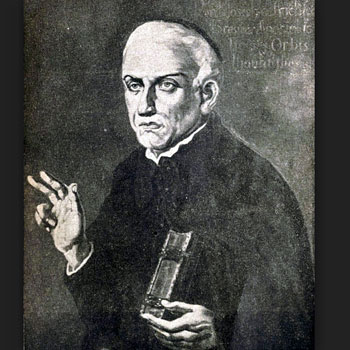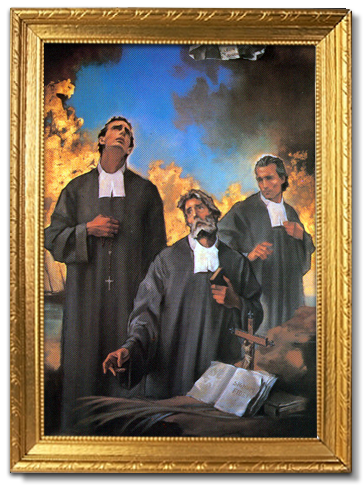June 9th - Blessed Joseph Imbert, SJ and John Nicholas Cordier, SJ
Blessed Joseph Imbert, SJ
Born : 1720
Died : June 9, 1794
Beatified: October 1, 1995
Bl John Nicholas Cordier, SJ
Born : December 3, 1710
Died : September 30, 1794
Beatified: October 1, 1995
 Joseph Imbert was born in Marseilles, France in 1720. He entered the Jesuit novitiate in Avignon in 1748 and took his first vows on June 29, 1750 and was ordained a Jesuit in 1754. He then taught at several colleges in Chalon-sur-Saone, Besancon, and Grenoble and it was at the latter when the Society was suppressed in France in 1762. He then joined the diocese of Moulins but was forced to leave this parish when he refused to accept the 1790 Civil Constitution of the Clergy and take the heretical oath. He had to continue his ministry in secret in Moulins while many priests left to go abroad.
Joseph Imbert was born in Marseilles, France in 1720. He entered the Jesuit novitiate in Avignon in 1748 and took his first vows on June 29, 1750 and was ordained a Jesuit in 1754. He then taught at several colleges in Chalon-sur-Saone, Besancon, and Grenoble and it was at the latter when the Society was suppressed in France in 1762. He then joined the diocese of Moulins but was forced to leave this parish when he refused to accept the 1790 Civil Constitution of the Clergy and take the heretical oath. He had to continue his ministry in secret in Moulins while many priests left to go abroad.
Fr Imbert was appointed vicar-apostolic of the diocese when the bishop of Moulins was expelled. As he was now the highest ranking official he was hated by the revolutionaries and was arrested in due course and incarcerated in Moulins for 30 days together with twenty-four other priests of the diocese. In early 1794 they were to be deported to Africa but to get there they had to journey from Moulins to Limoges, Saintes and then to Rochefort which took several months. To rekindle their apostolic spirit as well as to look upon their exile as an opportunity to carry Christ’s message to others, Fr Imbert set new lyrics to Rouget de Lisle’s patriotic hymn, La Marseillaise and this song was frequently sung by the prisoners that it became known as the Priests’ Marseillaise.
When they reached Rochefort they met many other priest-deportees from various other French cities and they were detained in hospitals, former convents and monasteries and on two small ships, La Boree and Nourrice, anchored on the Charente River and used as hospitals for the galleys. Fr Imbert was placed on the Nourrice. On April 11, 1795 all the priest-prisoners in Rochefort began to be transferred to the Deux-Associes anchored at the mouth of the Charente. Fr Imbert boarded the ship on April 13. As climbing the ladder was no easy task for the elderly priests, a sailor would push them upwards whenever they paused to catch their breath. Once on deck they were searched and all objects of devotion, such as prayer books and breviaries, were confiscated. In early May the ship was filled with more than 400 priests and the captain gave notice that there was no more room and another ship, the Washington was then called into service.
 John Nicholas Cordier was born near Souilly in the Duchy of Lorraine. He entered the novitiate in Nancy at eighteen and after completing his philosophy at the University of Pont-a-Mousson, he taught at colleges in Digon, Auxerre and Autun before returning to Pont-a-Mousson for theology and his doctorate. After his ordination he taught philosophy at Strasbourg before going to Rheims as prefect of studies and subsequently as superior of the residence in Saint-Mihiel in the diocese of Verdun. With the suppression of the Society in Lorraine in 1786, Fr Cordier remained in Saint-Mihiel as chaplain to a convent of nuns until 1790 when the government suppressed all religious orders in France.
John Nicholas Cordier was born near Souilly in the Duchy of Lorraine. He entered the novitiate in Nancy at eighteen and after completing his philosophy at the University of Pont-a-Mousson, he taught at colleges in Digon, Auxerre and Autun before returning to Pont-a-Mousson for theology and his doctorate. After his ordination he taught philosophy at Strasbourg before going to Rheims as prefect of studies and subsequently as superior of the residence in Saint-Mihiel in the diocese of Verdun. With the suppression of the Society in Lorraine in 1786, Fr Cordier remained in Saint-Mihiel as chaplain to a convent of nuns until 1790 when the government suppressed all religious orders in France.
Despite his advanced age, Fr Cordier was arrested on October 28, 1793, charged for being a refractory priest and ordered to be deported. He was imprisoned for six months before he was forced to join the convoy of priest-prisoners to Rochefort although he was only able to walk with great difficulty with the aid of a cane. Fr Cordier boarded the Washington on June 19, 1795.
The Deux-Associes and the Washington never set sail because the English navy had successfully blockaded the French coast. They continued to be anchored at the Charente estuary. As the ships were former slave ships, conditions were extremely harsh. With overcrowding, cramped space and the fetid and asphyxiating air, no sanitation facilities and insufficient food and clean water, many suffered respiratory problems and serious illnesses, such as scurvy and typhus. Each night, two to three would die and taken by their fellow priests under guard, to nearby Ille d”Aix and buried in the sand. Prayers for the dead were forbidden. Fr Imbert because of his weakened condition at the time of boarding was one of the first to die on June 9, 1794, most probably from typhus after being on board for less than two months. He was one of the 226 victims buried on that island.
The two ships were moved further up the Clarente because of the island inhabitants’ protest and anchored off the sparsely populated Ile Madame. The summer heat caused more to fall ill and a temporary hospital of marquees was erected on the island. Those transferred there thought themselves fortunate as they could hear birds singing, saw butterflies amid flowers and had fresh air to breathe. Fr Cordier was taken to this makeshift island hospital after he became ill and died there on September 30, 1794. He was one of the 254 victims buried there.
When the revolution ended with the fall of Robespierre in late July 1794, only 285 of the 822 priests (diocesan and religious) and 7 Christian brothers condemned to deportation survived the harsh treatment of the Reign of Terror of the French Revolution. Of the 557 who died, 64 for whom there were sufficient testimony concerning the manner in which they accepted their suffering and death were beatified by Pope John Paul II on October 1, 1995.
Frs Imbert and Cordier who were septuagenarian and octogenarian respectively at the time of their martyrdom are remembered by the Society as the Martyrs of the Rochefort Prison Ships.
